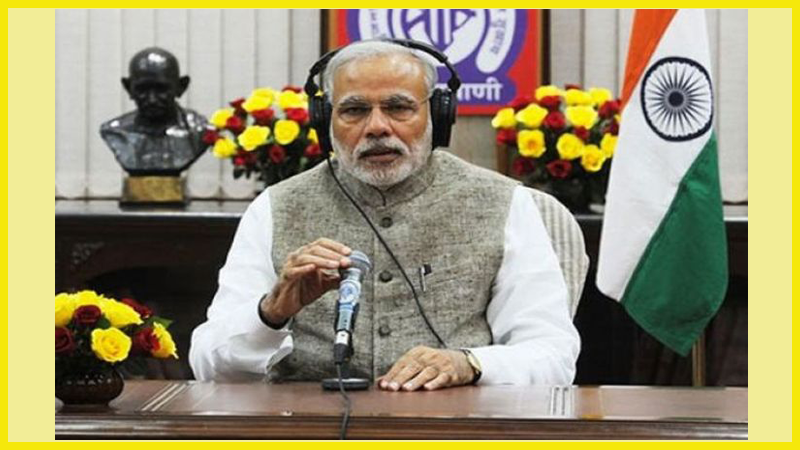Mann Ki Baat
In the 16th Episode of ‘Mann Ki Baat 2.0’ on September 27, Prime Minister Shri Narendra Modi said that during the COVID crisis, the farmers of the country have shown tremendous resilience. Prime Minister said that if the agriculture sector is strong, then the foundation of Atmanirbhar Bharat will remain strong. He noted that in the recent past, the sector has liberated from many restrictions and has tried to break free from many myths. He shared the example of Shri Kanwar Chauhan, a farmer from Haryana, who used to face great difficulties in marketing his fruits and vegetables outside the mandi, but in 2014, fruits and vegetables were excluded from the APMC Act, which greatly benefited him. He formed a Farmer Producer’s Organization and farmers in his village now cultivate sweet corn and baby corn and supply produce directly to Azadpur Mandi in Delhi, to big retail chains and Five Star Hotels, which has substantially boosted their income. Prime Minister underlined that these farmers have the power to sell their fruits and vegetables, anywhere and to anyone, which is the foundation of their progress, and now the same has been imparted to farmers all over the country, for the entire spectrum of their produce.
Prime Minister also cited the benefits accruing to farmers due to exclusion of fruits and vegetables from APMC purview by sharing the example of Sri Swami Samarth Farm Producer Company Limited – a Farmer Producer’s Organization in Maharashtra. He noted that farmers in Pune and Mumbai are running weekly markets themselves and selling directly without middlemen. He also talked about Tamil Nadu Banana farmer produce company, a collective of farmers, which purchased hundreds of metric tons of vegetables, fruits and bananas from nearby villages during the lockdown, and supplied a vegetable combo kit to Chennai. He mentioned the ‘Irada Farmer Producer’ group from Lucknow who, during the lockdown, procured fruits and vegetables directly from the cultivators’ fields, and sold directly in the markets of Lucknow, free from the middlemen.
Prime Minister noted that through innovations and application of new techniques, agriculture will progress further. He cited the example of Ismail Bhai, a farmer from Gujarat, who took up farming despite being discouraged by his family. He cultivated potatoes using drip irrigation technology – the high quality potatoes are now his hallmark, which he sells directly to large companies without middlemen, and earns huge profits. Prime Minister also shared the story of Ms. Bijay Shanti from Manipur who launched a start-up to develop thread from the Lotus stem, and noted that her efforts and innovations have opened new avenues in the fields of lotus farming and textile.
In the programme, Prime Minister Shri Narendra Modi discussed and reaffirmed the importance of storytelling.
Prime Minister noted that the history of stories is as ancient as the human civilization itself and said ‘where there is a soul, there is a story’. He talked about the significance of the convention of storytelling by elder members of the family. He discussed that through his interaction with children in the course of his travels, he realized that jokes had pervaded their lives in a major way, and they had no clue of stories.
Discussing the rich tradition of storytelling or Qissagoi in the country, Prime Minister said that India has nurtured the tradition of Hitopadesh and Panchatantra, which impart wisdom through an imaginary world of animals, birds and fairies. He mentioned ‘Katha’, an ancient form of religious storytelling, cited example of ‘Villu paat’ in Tamil Nadu and Kerala, which is a confluence of story and music, and also talked about the vibrant tradition of Kathputli. He noted the growing popularity of storytelling based on science and science- fiction.
Prime Minister praised several initiatives in promoting the art form of Qissagoi including ‘Gathastory.in’ run by IIM alumnus Shri Amar Vyas, initiative by Ms. Vaishali Vyawahare Deshpande in Marathi, initiative by Ms. Srividya Veer Raghavan from Chennai who is engaged in popularizing and disseminating stories related to our culture, ‘kathalaya.org’ initiative by Ms. Geeta Ramanujan, Indian Storytelling Network, and work being done by Shri Vikram Sridhar in Bengaluru, who is very enthusiastic about stories related to Mahatma Gandhi. Prime Minister also interacted with Ms. Aparna Athreya and other members of the Bengaluru Storytelling Society. The group also narrated a story on King Krishna Deva Rai and his minister Tenali Rama during the interaction.
Prime Minister urged storytellers to find ways to connect the new generation of the country with lives of great men and women through stories. He said that the art of storytelling must be popularized in every home and telling good stories to children should be a part of public life. He ideated that every week, family members should choose a theme like compassion, sensitivity, valour, sacrifice, bravery etc. and each member should tell a story on that subject. He said that the country is soon going to celebrate 75 years of independence, and urged storytellers to propagate inspiring events from the freedom struggle through their stories. He asked them to introduce every major and minor incident from 1857 to 1947 to the new generation through these stories.


